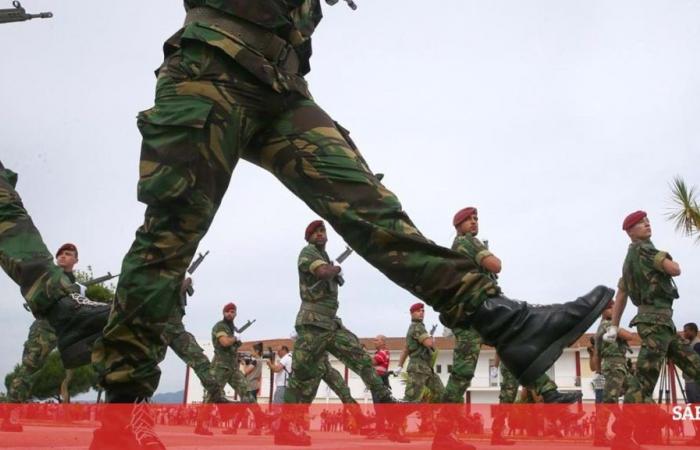The invasion of Ukraine by Russian troops and the fear of an escalation of tensions led several European countries to revive the discussion on the introduction of compulsory military service. But in Eastern Europe this discussion already started in 2014, with the annexation of Crimea. In Portugal, the conversation was born in the highest military spheres and has been gaining media support.
Since the return of war to European soil, the topic of Defense has been widely discussed. But if in the first two years of the conflict there was talk of supporting Ukraine through weapons and humanitarian aid, European countries allied with NATO are beginning to prepare their own defenses and look for ways to increase their numbers and train soldiers. One of the measures that has been on the table is compulsory military service, which is already a reality in several European countries (there were even some that never stopped having it). In Portugal, the conversation is beginning to reach the public sphere.
Currently in Europe Lithuania, Norway, Finland, Latvia, Sweden, Estonia, Denmark, Austria and Greece all have some form of compulsory military service. Ukraine and Russia also have this obligation for young people. And the return of this obligation is beginning to be discussed in countries such as Germany, Croatia, Romania, the Netherlands or Czechia.
Recently, Denmark announced that it will extend compulsory military service to women, whereas previously it was only mandatory for men. The Danish government also announced that it will increase the period of compulsory military service from four to 11 months, for both women and men. Lithuania has also announced its desire to extend the obligation to women. Previously, only Norway and Sweden had this requirement for both sexes.
Mandatory military service in Portugal
In Portugal, the possibility of re-introducing compulsory military service was advanced by Admiral Henrique Gouveia e Melo in a text in the newspaper’s magazine Express. After this text, andm interview with News Diary, Gouveia e Melo, Chief of Staff of the Navy, explained that in his opinion, compulsory military service should be introduced in different ways to what previously existed. “Compulsory military service should be another process of development and preparation for society and not a useless time in the Armed Forces”, he says, pointing to solutions that allow young people to carry out their academic training while carrying out their military service.
“In this process we attract young graduates and pay for their master’s degrees in technical areas that interest us, and they join our ranks as officers and can leave after three years, with their master’s degree already completed. Housing, food, clean clothes and a salary of 1,300 net euros while completing their master’s degree. Contributing to our knowledge as well”, said the admiral. The Chief of Staff of the Army (CEME), General Eduardo Ferrão, also defended, in an interview with the newspaper Expressthat the reintroduction of compulsory military service be studied, in support of the admiral.
A study of the National Defense Institute released in 2021 (before the war in Ukraine) showed that 40% of Portuguese people defend the return to mandatory military service, while the remaining 60% agreed that it should be voluntary. But in 2022, after the start of the war, a study carried out by researchers at Universidade Lusófona showed that 52.35% of respondents “agree” or “totally agree” with the return of compulsory military service, which was in force in Portugal until 2004. Only 32.75% of Portuguese people said they “disagreed” or “totally disagreed” with this type of decision.
After the start of the public discussion prompted by Gouveia e Melo’s article, national parties began to react. Among the parties, Left Bloc and Liberal Initiative have already come out against the possibility of this return. Chega says that the topic must be studied. Without an official position, António Filipe, from the PCP, recalls that the party argued that the extinction of mandatory military service was “not a good idea” in 1997.
Countries such as France and Germany have tried, in recent years, to voluntarily attract people to reinforce the Armed Forces, avoiding introducing mandatory military service. The proposed measures included increasing salaries, reinforcing pensions and the support guaranteed to those who joined the Armed Forces, whether through housing facilities or child education. For many years, the German army was unable to attract new soldiers, despite a vast initiative to reinforce it, the country’s Ministry of Defense announced in August last year. However, the situation has been changing, says the Politicalwith the population defending greater investment in defense and more young people wanting to enlist.
Several European experts point out that the private sector’s pay capacity is much more competitive than the Armed Forces’ pay capacity and that they do not carry as many dangers as a military career. An exceptional case is Finland, a country that has one of the best prepared armies in the world and which has widespread support from society. Several analysts point to the constant Russian threat that looms over the country as one of the reasons that explains this “willingness” of younger people to enlist.
Military service in Russia
One of the main reasons given for the return of compulsory military service in Europe is the possibility of Vladimir Putin trying to advance even further militarily, beyond Ukraine. And various defense analysts remember that Russia has a large system set up to recruit soldiers. Every year, tens of thousands of young Russians are called up for enlistment in the Russian Armed Forces. These calls happen twice a year, once in spring and once in autumn. All men in Russia are required to complete one year of military service, or equivalent training during higher education, from the age of 18.
In July, the Lower House of the Russian Parliament voted in favor of increasing the maximum age at which men can be conscripted, from 27 to 30. And last week Vladimir Putin signed the decree establishing the spring military conscription campaign, calling up 150,000 citizens for mandatory military service.
In September, Putin signed an order calling up 130,000 people for the autumn campaign, and last spring Russia planned to recruit 147,000 people.
Investment and NATO
What many experts have pointed out to newspapers such as Political or the Financial Times is that the increase in personnel should not be the greatest concern of States. NATO urges countries to increase their investment in Defense, including infrastructure and training of existing soldiers.
Jens Stoltenberg, Secretary General of NATO, assured in Brussels, at the beginning of 2024, that progress is being made in investment, as had been agreed at the Vilnius summit in 2023. European countries that are members of NATO will invest a total of 380 billion dollars in 2024. Eighteen NATO countries will meet the target of spending 2% of GDP on Defense this year.
Portugal remains far from this goal. According to the NATO Secretary General’s annual report for the year 2022, Portugal was the 9th member state of the organization with the lowest percentage of GDP dedicated to Defense, equivalent to 1.38%. The country expects to reach 2% only in 2030.






